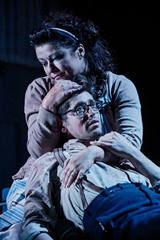| Opera Reviews | 26 April 2024 |
A kitchen-sink drama full of emotion
|
|
| Massenet: Werther English Touring Opera Harrogate October 2015 |
|
|
Instead of a full orchestra, there is a quartet at the back of the stage – violin, cello and clarinet, with arranger and conductor Iain Farrington on piano. Behind them is a mirrored backboard which adds depth. The rest of the stage is an eclectic – and thereby ordinary – domestic interior; drop-leaf formica table, four mismatching chairs, an Edwardian-era rocking chair, a dwarf rocking-horse, free-standing cooker. A kitchen-sink drama, complete with ironing-board. Le Bailli, whose house it is, is rehearsing his children in a Christmas carol – in high summer. Michael Druiett is comfortable in cords, with his whisky and his pipe, his household ably run by his eldest daughter Charlotte, since the death of his wife. Charlotte (Carolyn Dobbin) is so much part of the furniture that her frocks are the same turquoisy-blue as the paintwork and tiles – unlike her younger sister Sophie (Lauren Zolezzi). She is constrained by her vows to her dying mother – look after the children, marry Albert. Yes, Goethe’s Bildungsroman as feminist tract. Into her life comes Werther, a young poet, nerdy and geeky with Michael Caine glasses. Ed Ballard turns in an outstanding performance of hypernaturalism, to the extent that one almost forgets it is singing, so conversational he sounds. But then Albert (Simon Wallfisch) comes back – in GI uniform - and claims his bride. Charlotte, caught between the two, honours her vow and sends Werther away till Christmas. By then, Albert is out of uniform. When he returns home on Christmas Eve, shortly after Werther’s visit to Charlotte, he is in Brando-esque jeans, white T-shirt and leather jacket. The quartet arrangement gives quite different textures to the music and, when Werther returns, there’s a distinctly blues-y run on the clarinet, followed by percussive piano in the interlude La Nuit de Noel, between Acts 3 and 4. Maybe it does not create the same angsty atmosphere that a full orchestra would, thus making greater demands on the singers. Wallfisch’s Albert doesn’t see a geek as a rival, though he recognises Werther’s love for Charlotte. Though not quite reaching the hypernaturalism of Ballard, his singing is in the same conversational style, but with a macho edge. Zolezzi is a bright, brisk teenager without the rebellion, but with an eye for Werther since her sister can’t have him. It is left to Dobbin to do the emoting – over Werther’s letters – and she does it very well. Her duet with the dying Werther, after he has shot himself with her father’s pistol, is gentle and tender and moving. Our last sight of her, holding the pistol as darkness falls, conveys her barely expressed grief. The sheer ordinariness of Oliver Townsend’s set, the passage of time indicated only by Mark Howland’s lighting, and Oliver Platt’s direction turn this late nineteenth century French opera into a drama which could have been written 60 years later by John Osborne.
|
|
| Text ©
Catriona Graham Photo © Robert Workman |

 Pared down to its essentials and relocated to the Deep South, English Touring Opera’s production of Werther opens up new ways of hearing and seeing Massenet’s lyric drama.
Pared down to its essentials and relocated to the Deep South, English Touring Opera’s production of Werther opens up new ways of hearing and seeing Massenet’s lyric drama.






